Nursing Assignment: Cultural Competence in Healthcare - Standard 8
VerifiedAdded on 2023/04/21
|6
|1370
|322
Essay
AI Summary
This essay delves into the critical role of cultural competence in nursing, emphasizing the ethical standards set by the American Nurses Association (ANA) and particularly focusing on Standard 8 of Nursing: Scope and Standards of Practice. The paper highlights competencies 13, 14, and 15 of Standard 8, detailing how nurses can educate colleagues about cultural diversity, proactively research available community services for diverse populations, and implement policies that reflect respect, equality, diversity, and inclusion. It underscores the importance of self-awareness, reflective practice, and continuous education through workshops and seminars to enhance cultural competence and ensure culturally safe care delivery, ultimately improving patient outcomes by reducing stigmatization and disparity. The essay concludes that culturally congruent practice, which aligns nursing interventions with patients' cultural and religious beliefs, is essential for providing holistic and safe care.
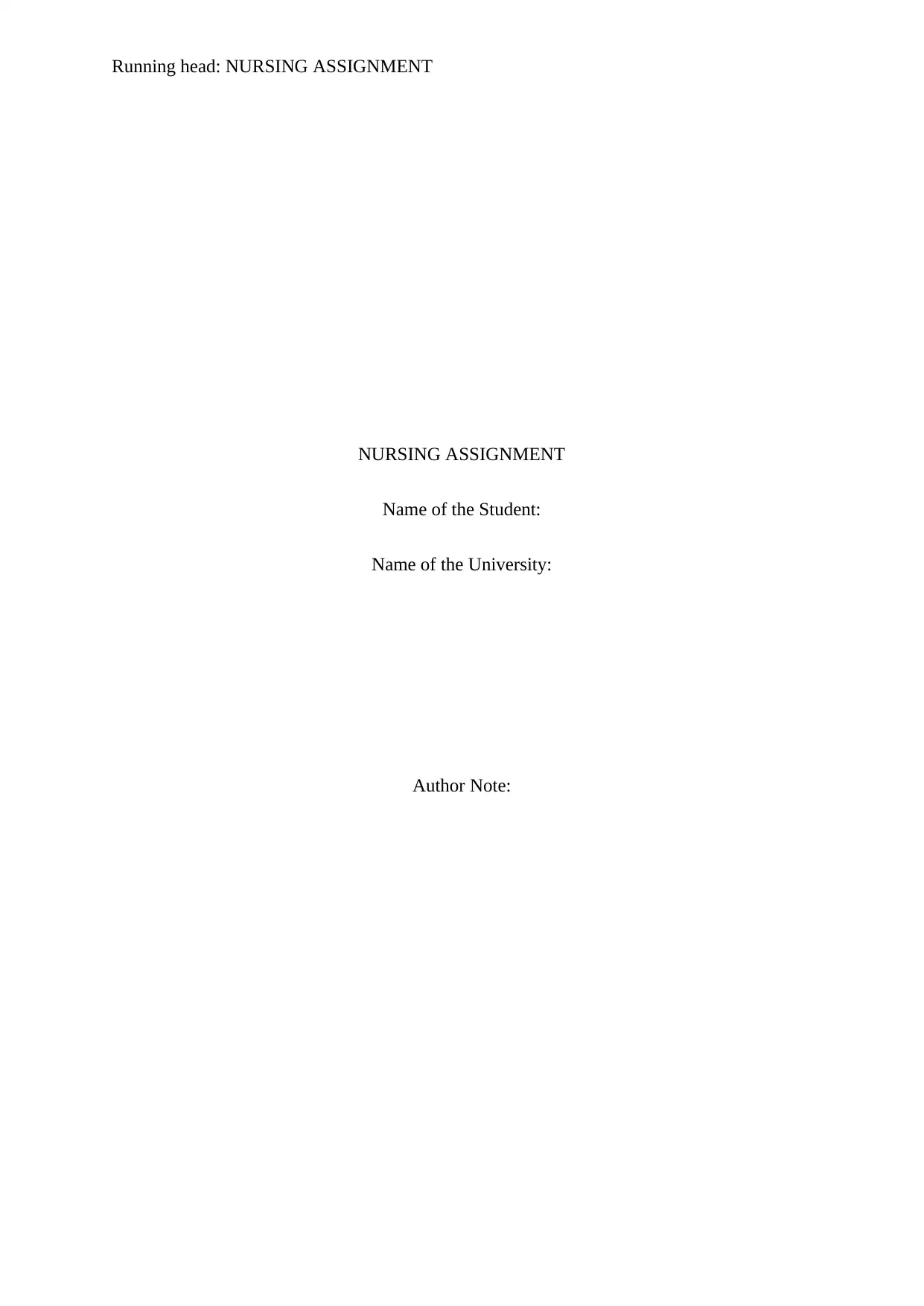
Running head: NURSING ASSIGNMENT
NURSING ASSIGNMENT
Name of the Student:
Name of the University:
Author Note:
NURSING ASSIGNMENT
Name of the Student:
Name of the University:
Author Note:
Paraphrase This Document
Need a fresh take? Get an instant paraphrase of this document with our AI Paraphraser
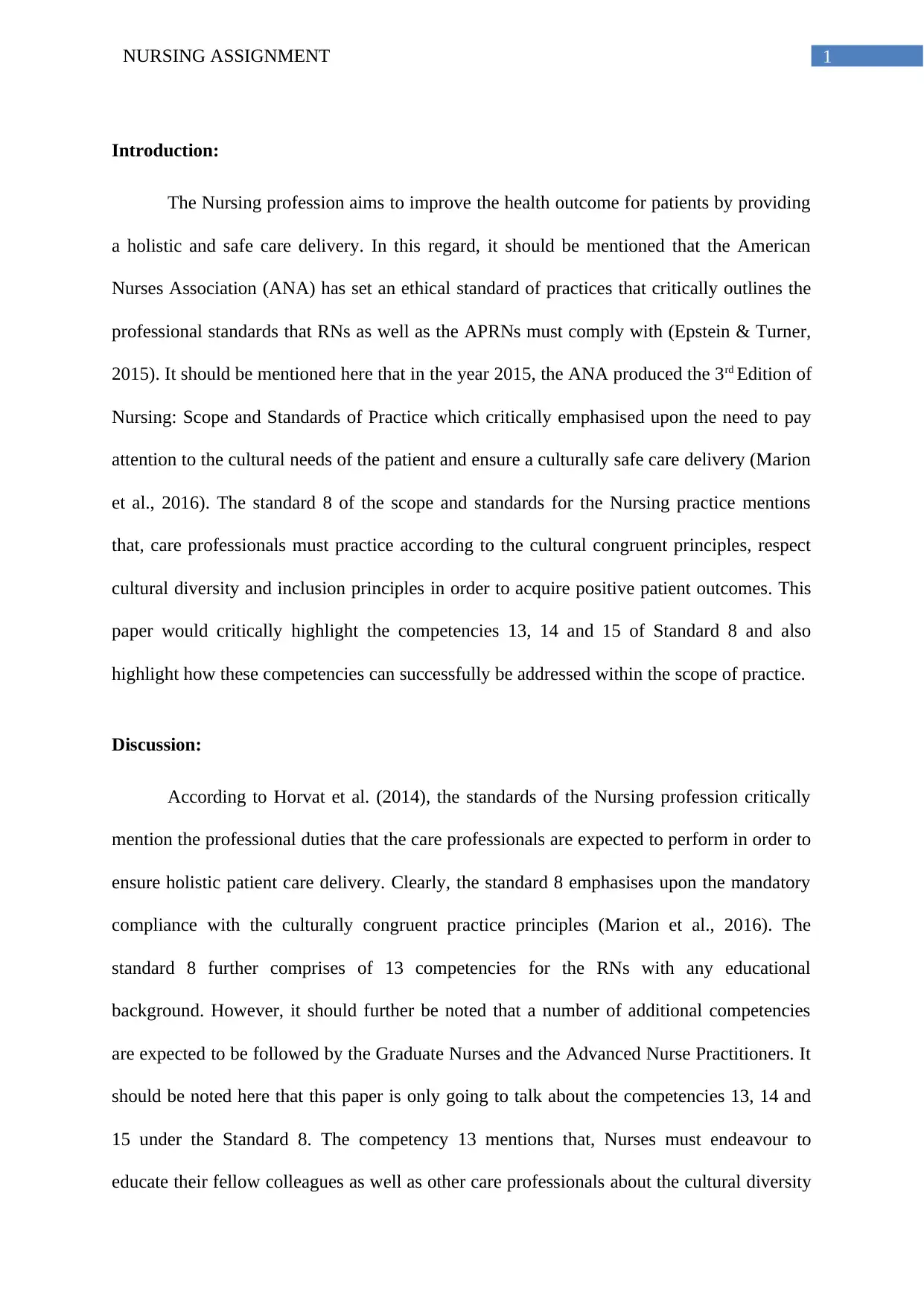
1NURSING ASSIGNMENT
Introduction:
The Nursing profession aims to improve the health outcome for patients by providing
a holistic and safe care delivery. In this regard, it should be mentioned that the American
Nurses Association (ANA) has set an ethical standard of practices that critically outlines the
professional standards that RNs as well as the APRNs must comply with (Epstein & Turner,
2015). It should be mentioned here that in the year 2015, the ANA produced the 3rd Edition of
Nursing: Scope and Standards of Practice which critically emphasised upon the need to pay
attention to the cultural needs of the patient and ensure a culturally safe care delivery (Marion
et al., 2016). The standard 8 of the scope and standards for the Nursing practice mentions
that, care professionals must practice according to the cultural congruent principles, respect
cultural diversity and inclusion principles in order to acquire positive patient outcomes. This
paper would critically highlight the competencies 13, 14 and 15 of Standard 8 and also
highlight how these competencies can successfully be addressed within the scope of practice.
Discussion:
According to Horvat et al. (2014), the standards of the Nursing profession critically
mention the professional duties that the care professionals are expected to perform in order to
ensure holistic patient care delivery. Clearly, the standard 8 emphasises upon the mandatory
compliance with the culturally congruent practice principles (Marion et al., 2016). The
standard 8 further comprises of 13 competencies for the RNs with any educational
background. However, it should further be noted that a number of additional competencies
are expected to be followed by the Graduate Nurses and the Advanced Nurse Practitioners. It
should be noted here that this paper is only going to talk about the competencies 13, 14 and
15 under the Standard 8. The competency 13 mentions that, Nurses must endeavour to
educate their fellow colleagues as well as other care professionals about the cultural diversity
Introduction:
The Nursing profession aims to improve the health outcome for patients by providing
a holistic and safe care delivery. In this regard, it should be mentioned that the American
Nurses Association (ANA) has set an ethical standard of practices that critically outlines the
professional standards that RNs as well as the APRNs must comply with (Epstein & Turner,
2015). It should be mentioned here that in the year 2015, the ANA produced the 3rd Edition of
Nursing: Scope and Standards of Practice which critically emphasised upon the need to pay
attention to the cultural needs of the patient and ensure a culturally safe care delivery (Marion
et al., 2016). The standard 8 of the scope and standards for the Nursing practice mentions
that, care professionals must practice according to the cultural congruent principles, respect
cultural diversity and inclusion principles in order to acquire positive patient outcomes. This
paper would critically highlight the competencies 13, 14 and 15 of Standard 8 and also
highlight how these competencies can successfully be addressed within the scope of practice.
Discussion:
According to Horvat et al. (2014), the standards of the Nursing profession critically
mention the professional duties that the care professionals are expected to perform in order to
ensure holistic patient care delivery. Clearly, the standard 8 emphasises upon the mandatory
compliance with the culturally congruent practice principles (Marion et al., 2016). The
standard 8 further comprises of 13 competencies for the RNs with any educational
background. However, it should further be noted that a number of additional competencies
are expected to be followed by the Graduate Nurses and the Advanced Nurse Practitioners. It
should be noted here that this paper is only going to talk about the competencies 13, 14 and
15 under the Standard 8. The competency 13 mentions that, Nurses must endeavour to
educate their fellow colleagues as well as other care professionals about the cultural diversity
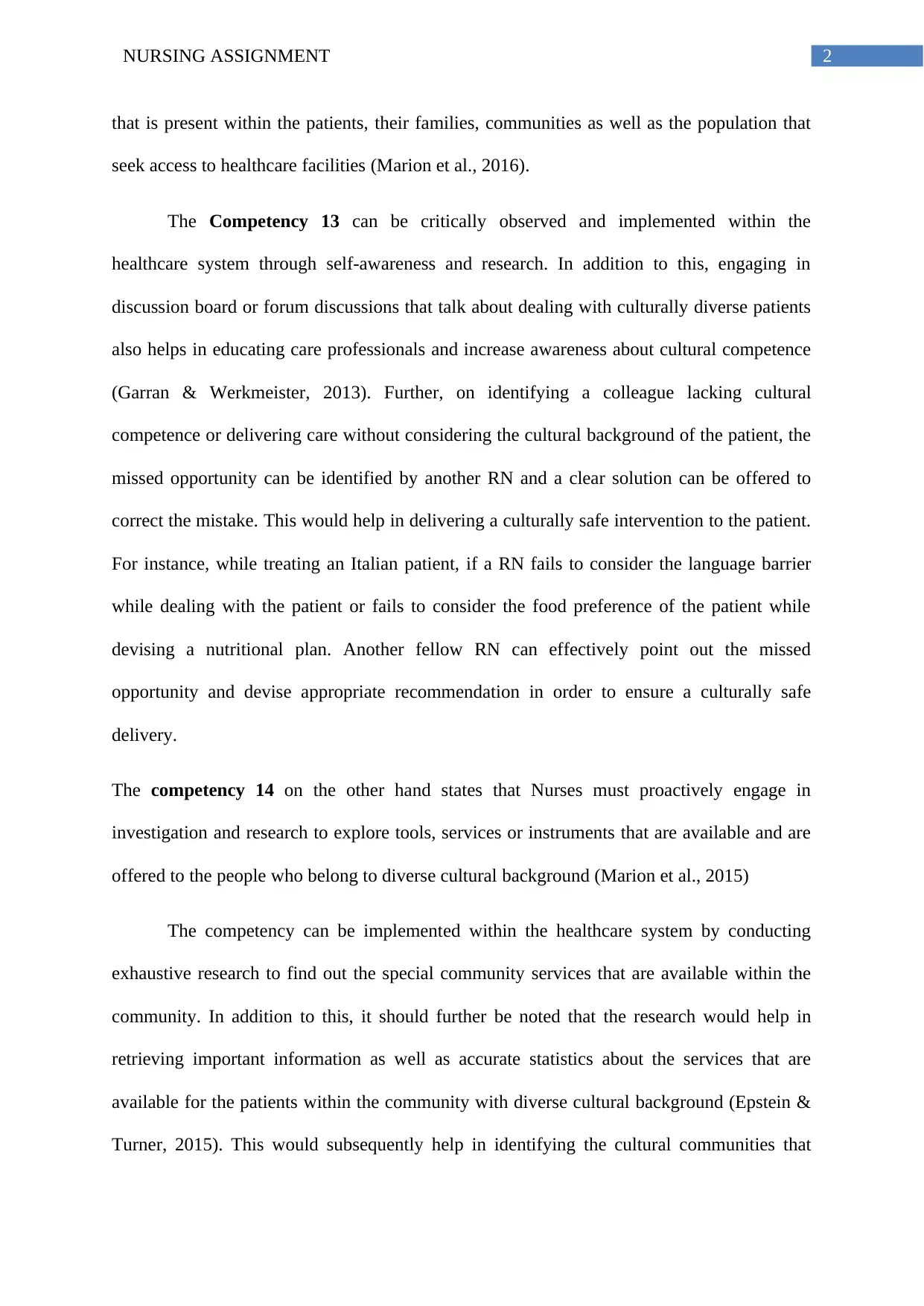
2NURSING ASSIGNMENT
that is present within the patients, their families, communities as well as the population that
seek access to healthcare facilities (Marion et al., 2016).
The Competency 13 can be critically observed and implemented within the
healthcare system through self-awareness and research. In addition to this, engaging in
discussion board or forum discussions that talk about dealing with culturally diverse patients
also helps in educating care professionals and increase awareness about cultural competence
(Garran & Werkmeister, 2013). Further, on identifying a colleague lacking cultural
competence or delivering care without considering the cultural background of the patient, the
missed opportunity can be identified by another RN and a clear solution can be offered to
correct the mistake. This would help in delivering a culturally safe intervention to the patient.
For instance, while treating an Italian patient, if a RN fails to consider the language barrier
while dealing with the patient or fails to consider the food preference of the patient while
devising a nutritional plan. Another fellow RN can effectively point out the missed
opportunity and devise appropriate recommendation in order to ensure a culturally safe
delivery.
The competency 14 on the other hand states that Nurses must proactively engage in
investigation and research to explore tools, services or instruments that are available and are
offered to the people who belong to diverse cultural background (Marion et al., 2015)
The competency can be implemented within the healthcare system by conducting
exhaustive research to find out the special community services that are available within the
community. In addition to this, it should further be noted that the research would help in
retrieving important information as well as accurate statistics about the services that are
available for the patients within the community with diverse cultural background (Epstein &
Turner, 2015). This would subsequently help in identifying the cultural communities that
that is present within the patients, their families, communities as well as the population that
seek access to healthcare facilities (Marion et al., 2016).
The Competency 13 can be critically observed and implemented within the
healthcare system through self-awareness and research. In addition to this, engaging in
discussion board or forum discussions that talk about dealing with culturally diverse patients
also helps in educating care professionals and increase awareness about cultural competence
(Garran & Werkmeister, 2013). Further, on identifying a colleague lacking cultural
competence or delivering care without considering the cultural background of the patient, the
missed opportunity can be identified by another RN and a clear solution can be offered to
correct the mistake. This would help in delivering a culturally safe intervention to the patient.
For instance, while treating an Italian patient, if a RN fails to consider the language barrier
while dealing with the patient or fails to consider the food preference of the patient while
devising a nutritional plan. Another fellow RN can effectively point out the missed
opportunity and devise appropriate recommendation in order to ensure a culturally safe
delivery.
The competency 14 on the other hand states that Nurses must proactively engage in
investigation and research to explore tools, services or instruments that are available and are
offered to the people who belong to diverse cultural background (Marion et al., 2015)
The competency can be implemented within the healthcare system by conducting
exhaustive research to find out the special community services that are available within the
community. In addition to this, it should further be noted that the research would help in
retrieving important information as well as accurate statistics about the services that are
available for the patients within the community with diverse cultural background (Epstein &
Turner, 2015). This would subsequently help in identifying the cultural communities that
⊘ This is a preview!⊘
Do you want full access?
Subscribe today to unlock all pages.

Trusted by 1+ million students worldwide
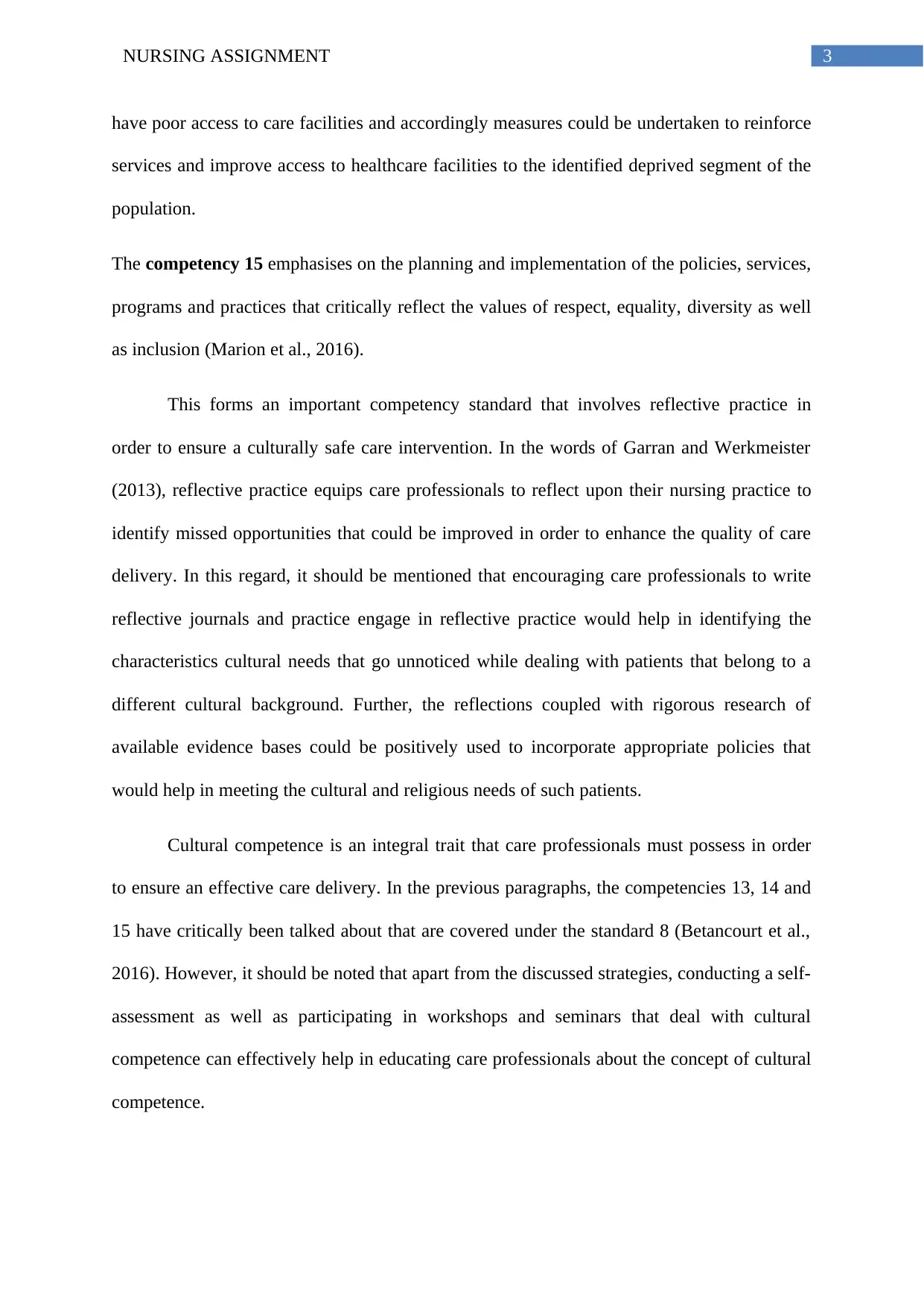
3NURSING ASSIGNMENT
have poor access to care facilities and accordingly measures could be undertaken to reinforce
services and improve access to healthcare facilities to the identified deprived segment of the
population.
The competency 15 emphasises on the planning and implementation of the policies, services,
programs and practices that critically reflect the values of respect, equality, diversity as well
as inclusion (Marion et al., 2016).
This forms an important competency standard that involves reflective practice in
order to ensure a culturally safe care intervention. In the words of Garran and Werkmeister
(2013), reflective practice equips care professionals to reflect upon their nursing practice to
identify missed opportunities that could be improved in order to enhance the quality of care
delivery. In this regard, it should be mentioned that encouraging care professionals to write
reflective journals and practice engage in reflective practice would help in identifying the
characteristics cultural needs that go unnoticed while dealing with patients that belong to a
different cultural background. Further, the reflections coupled with rigorous research of
available evidence bases could be positively used to incorporate appropriate policies that
would help in meeting the cultural and religious needs of such patients.
Cultural competence is an integral trait that care professionals must possess in order
to ensure an effective care delivery. In the previous paragraphs, the competencies 13, 14 and
15 have critically been talked about that are covered under the standard 8 (Betancourt et al.,
2016). However, it should be noted that apart from the discussed strategies, conducting a self-
assessment as well as participating in workshops and seminars that deal with cultural
competence can effectively help in educating care professionals about the concept of cultural
competence.
have poor access to care facilities and accordingly measures could be undertaken to reinforce
services and improve access to healthcare facilities to the identified deprived segment of the
population.
The competency 15 emphasises on the planning and implementation of the policies, services,
programs and practices that critically reflect the values of respect, equality, diversity as well
as inclusion (Marion et al., 2016).
This forms an important competency standard that involves reflective practice in
order to ensure a culturally safe care intervention. In the words of Garran and Werkmeister
(2013), reflective practice equips care professionals to reflect upon their nursing practice to
identify missed opportunities that could be improved in order to enhance the quality of care
delivery. In this regard, it should be mentioned that encouraging care professionals to write
reflective journals and practice engage in reflective practice would help in identifying the
characteristics cultural needs that go unnoticed while dealing with patients that belong to a
different cultural background. Further, the reflections coupled with rigorous research of
available evidence bases could be positively used to incorporate appropriate policies that
would help in meeting the cultural and religious needs of such patients.
Cultural competence is an integral trait that care professionals must possess in order
to ensure an effective care delivery. In the previous paragraphs, the competencies 13, 14 and
15 have critically been talked about that are covered under the standard 8 (Betancourt et al.,
2016). However, it should be noted that apart from the discussed strategies, conducting a self-
assessment as well as participating in workshops and seminars that deal with cultural
competence can effectively help in educating care professionals about the concept of cultural
competence.
Paraphrase This Document
Need a fresh take? Get an instant paraphrase of this document with our AI Paraphraser
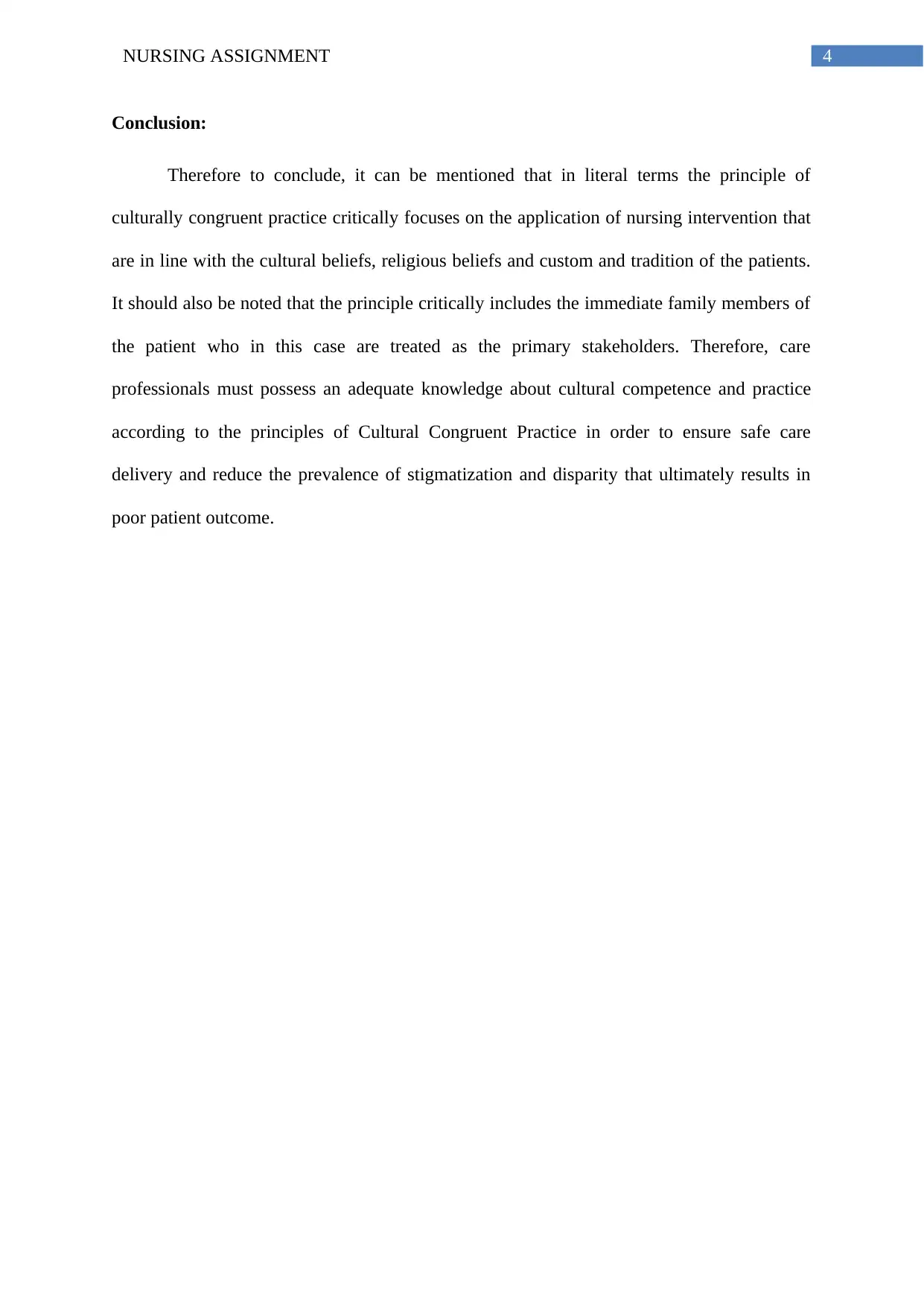
4NURSING ASSIGNMENT
Conclusion:
Therefore to conclude, it can be mentioned that in literal terms the principle of
culturally congruent practice critically focuses on the application of nursing intervention that
are in line with the cultural beliefs, religious beliefs and custom and tradition of the patients.
It should also be noted that the principle critically includes the immediate family members of
the patient who in this case are treated as the primary stakeholders. Therefore, care
professionals must possess an adequate knowledge about cultural competence and practice
according to the principles of Cultural Congruent Practice in order to ensure safe care
delivery and reduce the prevalence of stigmatization and disparity that ultimately results in
poor patient outcome.
Conclusion:
Therefore to conclude, it can be mentioned that in literal terms the principle of
culturally congruent practice critically focuses on the application of nursing intervention that
are in line with the cultural beliefs, religious beliefs and custom and tradition of the patients.
It should also be noted that the principle critically includes the immediate family members of
the patient who in this case are treated as the primary stakeholders. Therefore, care
professionals must possess an adequate knowledge about cultural competence and practice
according to the principles of Cultural Congruent Practice in order to ensure safe care
delivery and reduce the prevalence of stigmatization and disparity that ultimately results in
poor patient outcome.
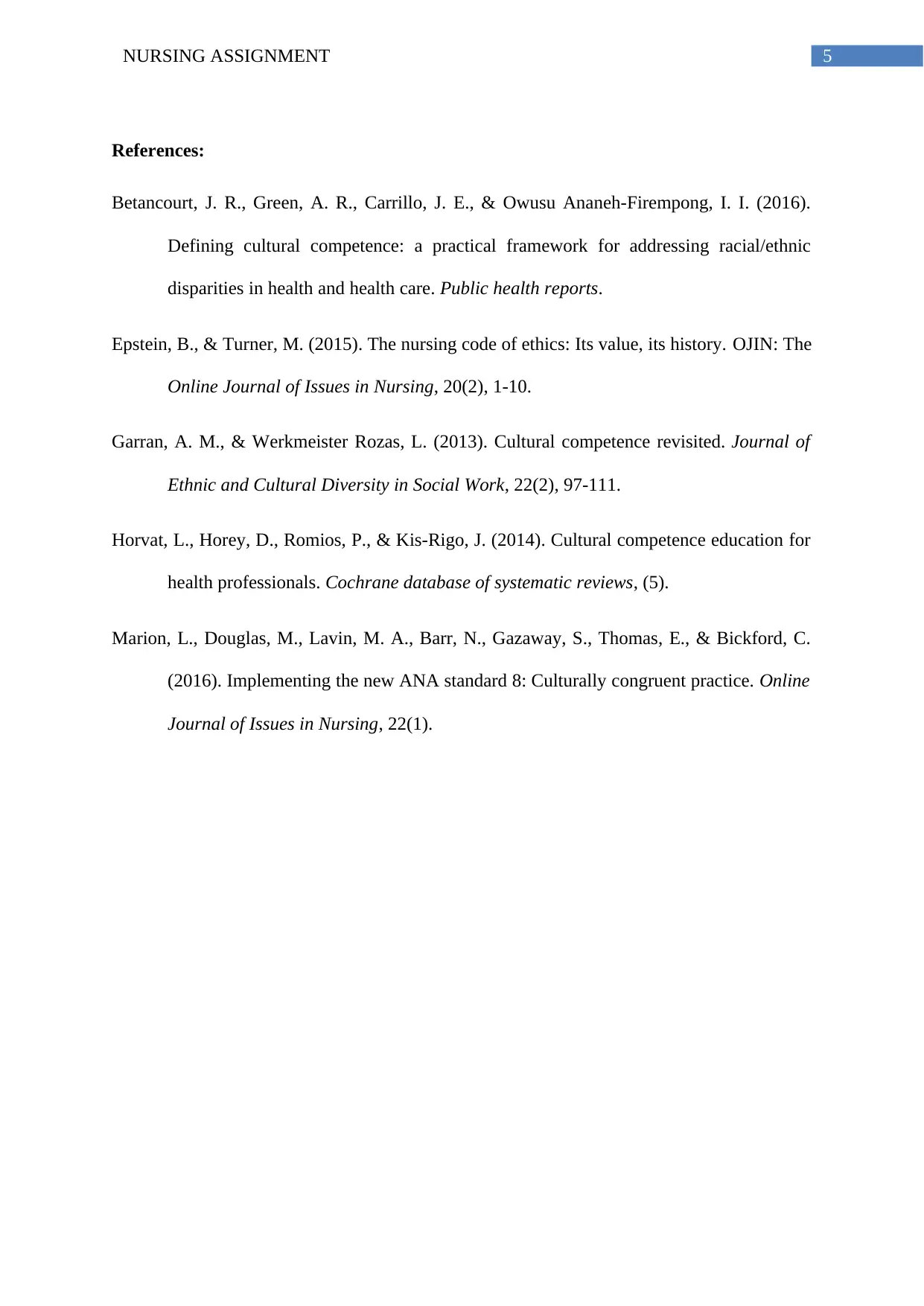
5NURSING ASSIGNMENT
References:
Betancourt, J. R., Green, A. R., Carrillo, J. E., & Owusu Ananeh-Firempong, I. I. (2016).
Defining cultural competence: a practical framework for addressing racial/ethnic
disparities in health and health care. Public health reports.
Epstein, B., & Turner, M. (2015). The nursing code of ethics: Its value, its history. OJIN: The
Online Journal of Issues in Nursing, 20(2), 1-10.
Garran, A. M., & Werkmeister Rozas, L. (2013). Cultural competence revisited. Journal of
Ethnic and Cultural Diversity in Social Work, 22(2), 97-111.
Horvat, L., Horey, D., Romios, P., & Kis‐Rigo, J. (2014). Cultural competence education for
health professionals. Cochrane database of systematic reviews, (5).
Marion, L., Douglas, M., Lavin, M. A., Barr, N., Gazaway, S., Thomas, E., & Bickford, C.
(2016). Implementing the new ANA standard 8: Culturally congruent practice. Online
Journal of Issues in Nursing, 22(1).
References:
Betancourt, J. R., Green, A. R., Carrillo, J. E., & Owusu Ananeh-Firempong, I. I. (2016).
Defining cultural competence: a practical framework for addressing racial/ethnic
disparities in health and health care. Public health reports.
Epstein, B., & Turner, M. (2015). The nursing code of ethics: Its value, its history. OJIN: The
Online Journal of Issues in Nursing, 20(2), 1-10.
Garran, A. M., & Werkmeister Rozas, L. (2013). Cultural competence revisited. Journal of
Ethnic and Cultural Diversity in Social Work, 22(2), 97-111.
Horvat, L., Horey, D., Romios, P., & Kis‐Rigo, J. (2014). Cultural competence education for
health professionals. Cochrane database of systematic reviews, (5).
Marion, L., Douglas, M., Lavin, M. A., Barr, N., Gazaway, S., Thomas, E., & Bickford, C.
(2016). Implementing the new ANA standard 8: Culturally congruent practice. Online
Journal of Issues in Nursing, 22(1).
⊘ This is a preview!⊘
Do you want full access?
Subscribe today to unlock all pages.

Trusted by 1+ million students worldwide
1 out of 6
Related Documents
Your All-in-One AI-Powered Toolkit for Academic Success.
+13062052269
info@desklib.com
Available 24*7 on WhatsApp / Email
![[object Object]](/_next/static/media/star-bottom.7253800d.svg)
Unlock your academic potential
Copyright © 2020–2026 A2Z Services. All Rights Reserved. Developed and managed by ZUCOL.





